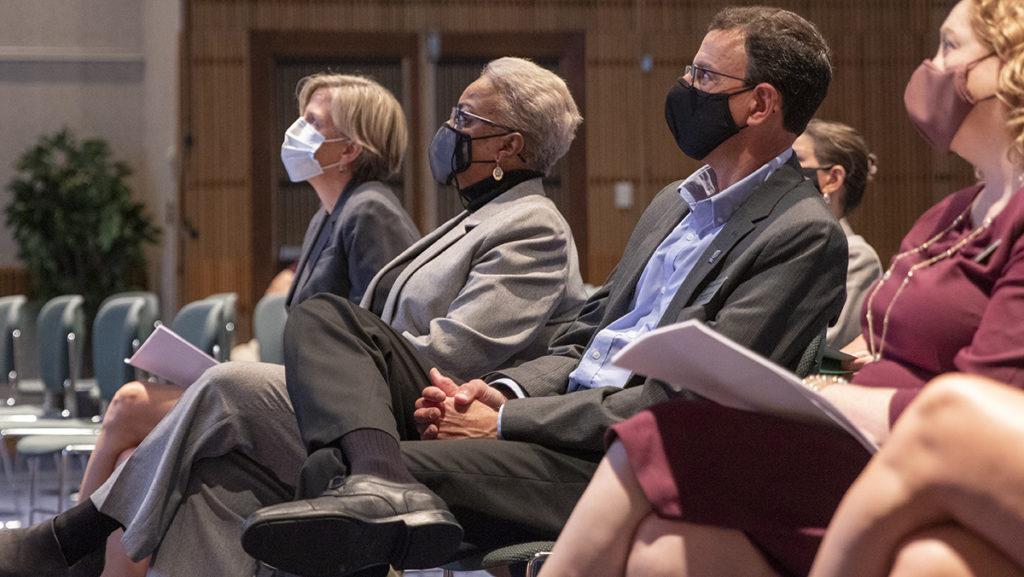The Ithaca College Senior Leadership Team (SLT) gave updates regarding the college’s enrollment, finances and goals for the 2021–22 academic year at the State of the College gathering Oct. 5.
La Jerne Cornish, interim president of the college, welcomed about 60 members of the campus community who attended the meeting in the Emerson Suites. The event was also livestreamed for those who could not attend in person. She outlined her five goals as interim president this year: prioritizing financial stability, advancing the Ithaca Forever strategic plan, communicating with alumni and creating engagement, retaining and supporting talent across the college and leveraging and exploring partnerships among the SLT. Cornish previously discussed some of her goals at the All-College Gathering Aug. 31.
Cornish said this academic year is the third year of the implementation of the five-year strategic plan, Ithaca Forever. Though the strategic plan has always been meant to take place over the course of five years, Shirley M. Collado, former president and senior advisor to the interim president and the Ithaca College Board of Trustees, has said the COVID-19 pandemic accelerated the implementation of the strategic plan.
Cornish said the student experience is at the center of everything the college does.
“Students are our ‘why’ and they are at the heart of every decision that we make and should be at the heart of everything we do,” she said.
Enrollment
Laurie Koehler, vice president for Marketing and Enrollment Strategy, said enrollment increased from Fall 2020, but it is not as high as it was in Fall 2019. Because Fall 2020 was held remotely, many students took leaves of absence or deferred enrollment, leading to a decrease in enrollment. Koehler said there are a total of 5,239 students with 4,778 undergraduate, 421 graduate students and 40 extramural and exchange students enrolled in Fall 2021. The target enrollment number was 4,730 undergraduate students, Koehler said. Freshman enrollment rose from Fall 2020 when 992 freshmen were enrolled, to Fall 2021, when 1,166 freshmen were enrolled, but overall enrollment decreased.
In Fall 2020, there were 4,957 undergraduate students enrolled at the college, with a total of 5,354 students. In Fall 2019 there were 6,266 total students and in Fall 2018 there were 6,517.
“We, like most others, weathered a tough 2020, and I’m pleased that this year we’re doing better,” Koehler said. “We’re not where we want to be, and we know we’re battling market forces that are at play nationally and regionally, but at the end of the day, based on our census data, we’re in a good position to land very close to our net tuition revenue target.”
Overall enrollment at the college has been decreasing over the past few years, mirroring national trends for colleges in the Northeast.
Koehler said there are fewer students of color and first–generation students enrolled for this academic year as well. She said this decrease mirrors national trends and is concerning for the college. The number of Black or African American students has been decreasing since Fall 2018 with 358 students, 350 in Fall 2019, 319 in Fall 2020 and 285 in Fall 2021. The number of Asian students has also decreased since Fall 2018 with 262 students, 260 students in Fall 2019, 215 students in Fall 2020 and 205 students in Fall 2021. Hispanic or Latino students decreased from Fall 2019 as well with 562 students, 539 students in Fall 2020 and 525 students in Fall 2021.
“We have to do what we can to address educational equity issues nationally, but also in our own spirit and influence here at Ithaca College,” she said.
She also said that while the third semester retention rate rebounded after the effects of the COVID-19 pandemic, it was not at the level it was before the pandemic. According to the presentation given by the SLT, the retention rate for third semester students was 87.9% in 2019, 77.1% in 2020 and 84.2% in 2021.
Finances
Tim Downs, vice president for Finance and Administration and chief financial officer, said the college’s operating expenses have decreased from the 2019 fiscal year to the 2021 fiscal year by $62,510,209. Downs said part of the decrease was caused by the college taking measures to prevent running into a deeper deficit.
“To understand why the IC community feels like it’s reeling is because we’ve made significant movements to keep ourselves from being financially stable from an operating budget perspective,” he said.
Downs said the college’s revenue was down $74 million because there were no students on campus during Fall 2020 when the college was closed because of the COVID-19 pandemic. However, he said the revenue has increased for the 2021 fiscal year from $178,374,216 to $220,141,532.
In the 2019 fiscal year, total tuition, room and board totaled $211,472,084, and in the 2021 fiscal year, the college made $137,978,111 from tuition, room and board. Downs said for the 2022 fiscal year, the amount the college is making from tuition, room and board has increased to $182,240,632. The college’s budget model relies heavily on student fees, like room and board.
“Our goal is to build back and restore everything we can in future years,” he said. “But as you can see, we are still in a deficit position, and it is going to take a lot more from everybody as we work on this and figure out how we can make our operating budgets stronger.”
Downs said that despite the college’s deficit, there was a $90 million increase in non-operating activities, predominantly coming from the college’s endowment. Downs said there was a $10.3 million decrease in net assets for fiscal year 2021 compared with a $3.4 million decrease in net assets for fiscal year 2020. He said the endowment is going to be finalized soon but should be about $420 million. Downs said the college’s net assets are at the highest they have ever been institutionally. For the 2021 fiscal year, the total net assets are $710,068,000. In 2020, it was $632,234,337 and in 2019 it was $653,546,879.
He said many members of the campus community ask if the college can spend the endowment. Downs said the college takes out about $14 million of the endowment every year.
“We cannot continue to draw on this too heavily or future generations will not have the ability to use the endowment,” he said.
Downs also discussed the 2022 Cortaca Jug game. The college, along with SUNY Cortland, announced Sept. 21 that the 2022 game would be held at Yankee Stadium, drawing mixed reactions from the campus community.
Downs said the Yankees organization reached out to the college about playing at Yankee Stadium in 2022. He said the Yankees organization and a promoter, 5167 Sports Media, are in contract with one another and take all the risk of holding the game. Ithaca College and SUNY Cortland are in a contract with the promoter and are using a stipend to pay for the teams to play at Yankee Stadium. Downs also said the success of the 2019 Cortaca Jug game at MetLife Stadium opened doors for the college to host the game at other large venues. The 2019 game broke the record for number of people who attended a Division III football game.
However, Downs did not disclose the amount of money that Ithaca College is paying for Cortaca 2022 or how much the college will make from the game.
Academic Affairs
Interim Provost Melanie Stein said the college’s agenda for the 2021–22 academic year is titled “Stabilizing and Strengthening While Innovating.” She said the COVID-19 pandemic has created more ways for people to be innovative, which inspired the theme for the year.
Stein also gave updates regarding the college’s student-to-faculty ratio, which uses full-time equivalent (FTE) faculty, faculty members who work a certain amount of time, usually a full work week, as opposed to the headcount, which is the entire faculty. She said from 1993–2010 the ratio was steadily between 11.7-to-1–12.5-to-1 and has been decreasing with the lowest being 9.3-to-1 in 2020. She said that in the 2020–21 academic year, the ratio increased to an estimated 10.4-to-1 and the college hopes to increase the number back to the 11.5-to-1–12.1-to-1 range for the 2021–22 academic year.
Resizing the student-to-faculty ratio was also a reason for the Academic Program Prioritization (APP) process and the faculty cuts that began during the 2020–21 academic year.
“This was in alignment with our strategic plan; we deliberately set out to do this,” she said. “The task for the coming year is to continue moving toward our target stable ratio, ensuring that we have a quality curriculum which is more flexible for our students and aligns with our resources.”
Stein said the college is also going to focus on curricular revision and resource allocation for professors. She also said the college is beginning to restart the three dean searches that have been on pause because of the COVID-19 pandemic. There are currently four interim deans out of five at the college, but only three searches: Jack Powers in the Roy H. Park School of Communications, Alka Bramhandkar in the School of Business and Ivy Walz in the School of Music. Stein is the dean of the School of Humanities and Sciences, but took on the position of interim provost after Cornish was named interim president for the 2021–22 academic year. Claire Gleitman is the interim dean of the School of Humanities and Sciences while Stein is interim provost.
Stein said the search committee chairs have all been appointed as well. Jack Bryant, associate professor and program director of the Department of Media Arts, Sciences and Studies, will chair the dean search for the School of Communications; Christine Bataille, associate professor and chair of the Department of Management, will chair the dean search for the School of Business; and Chrystyna Dail, associate professor in the Department of Theatre Arts, and James Mick, associate professor in the Department of Music Education, are co–chairing the dean search for the new combination of music and theatre arts.
The college began discussions of moving the Department of Theatre Arts to the School of Music during Spring 2021. The move is part of the second phase of the APP and will take place before Fall 2022.
Philanthropy and Engagement
Wendy Kobler, vice president for Philanthropy and Engagement, discussed some of the goals she has for the 2022 fiscal year, including distributing a survey for all alumni, building campus culture that supports philanthropy and engagement, securing $800,000 for the college’s annual fund and working with different members of the campus community to identify philanthropic and engagement opportunities. Alumni donations have been decreasing over the past few years from 12.2% of alumni in the 2010 fiscal year to 6.4% of alumni in the 2019 fiscal year.
Kobler also said the college has set a Giving Day goal of $2 million. The 2021 Giving Day raised a record-breaking $1,856,486.
Student Affairs and Campus Life
Rosanna Ferro, vice president for Student Affairs and Campus Life, went over how Fall Welcome and freshman orientation went in Fall 2021. She said 350 freshmen participated in the Jumpstart Program, which takes place before orientation, and there were 36 Fall Welcome events for all students to participate in.
“We wanted to welcome back all students. … There was a tremendous effort and many people across the campus got together to make sure we had thoughtful programming that was engaging and again, was safe,” she said.
Ferro said orientation was held in person, however, there were many small groups to keep students safe amid the COVID-19 pandemic. She also said there were orientation events specific for sophomores who did not have a freshman orientation at the beginning of Fall 2020.
Cornish closed out the gathering by reminding the campus community of the annual board of trustees meeting Oct. 20–22.









